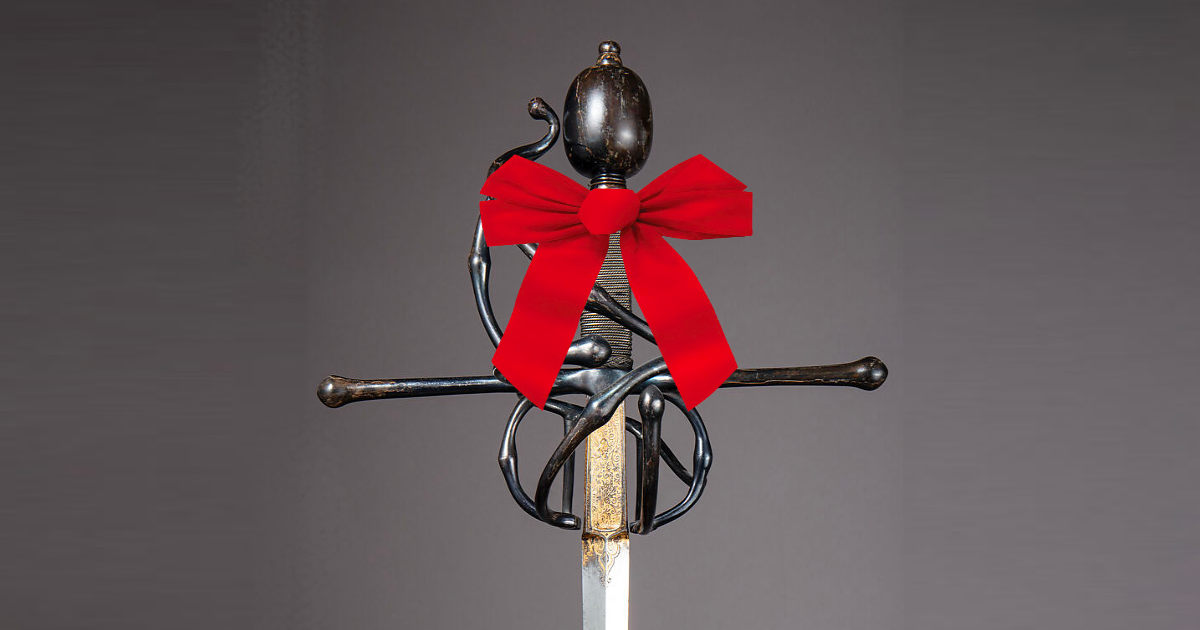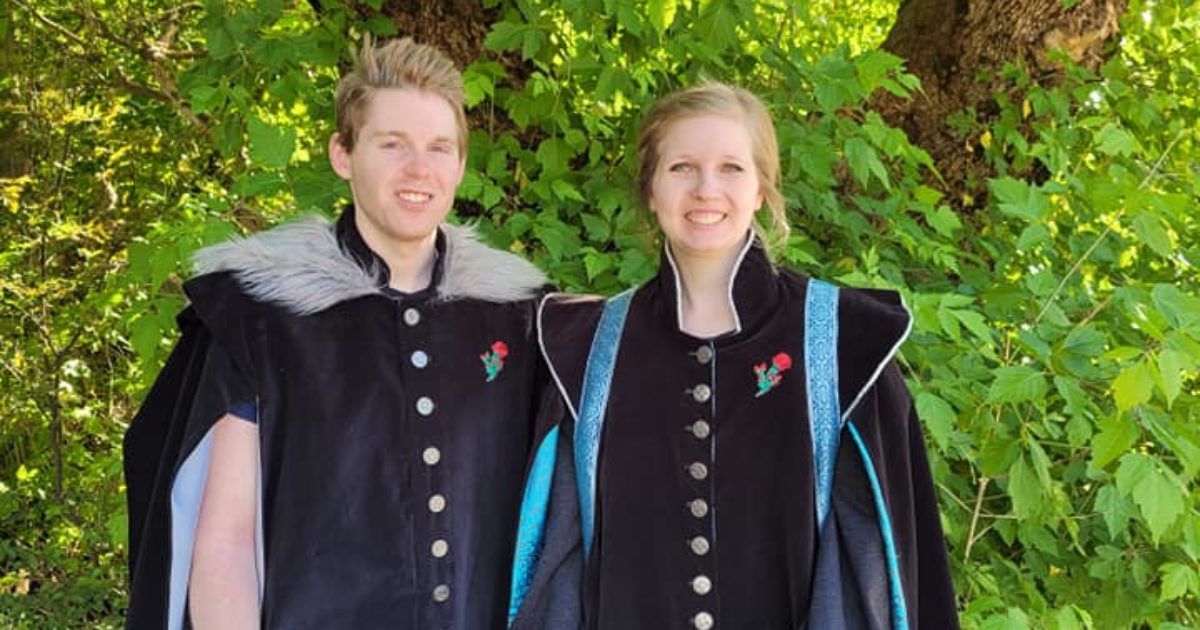“Communication is Magic!?” Cyrus laughed out loud, doubling over and nearly dropping the sheaves of paper in his hands. “Hah! Where do you get this nonsense?” He made a stupid face, “Look at me! I’m a sorcerer ‘cause I can speak!”
Draco considered his response carefully, then punched Stupidface in the face. It wasn’t permissible to strike other members of the Order outside of the training grounds, but there was no “Stupidface” on the rosters. Cyrus was usually an okay guy, so this obviously was not him.
Logic.
Draco grabbed his thesis before it could hit the ground. Luckily, he’d taken the time to bind it together, so it didn’t scatter—but, then again, now he’d have to undo the binding to redo the title page and a few other pages that referenced it…
Draco sighed as he walked away into the woods, ignoring Cyrus’s angry shouts behind him. Something about a duel and something else about laws. No witnesses, though there might be a bruise. Probably a bad idea, after all.
Draco removed a knife from his belt—iron, of course—and slit the binding to his thesis down the middle. He grimaced at the sizzling sound as the knife burned through the Heartwood cords of the binding. It was beautiful wood from his home, where iron always burned. He stowed the knife and walked into a tree, melding with the wood and willing his way into the enchanted woods of another world.
The Realm of the Fae had long been his haunt, a refuge now that his servitude was so light. Pun, he thought, Quite appropriate, too. Notebook…
He paused to search his pockets, but quickly discovered his notebook was missing. The one with embarrassing secrets. In a momentary panic, he realized that he must have left it at a table in the common room, and he almost turned back to retrieve it. But then he remembered he’d recently started a new one, writing in a cipher based on three separate Faerie languages. No one but him would ever be able to read it. He smiled at the sheer genius of his solution to their snooping as he made his way home.
He walked through the doorless doorway of his hovel, basically a wooden pustule on the side of a gigantic tree that twisted its way to heaven—well, certainly not Heaven, but toward the heavens. Did the Fae even go to Heaven? Would they want to, when they already lived in such a beautiful place?
It might be beautiful, but wars were not, and the Faerie Realm had been host to many, even in Draco’s short time in it. He’d only been there 237 years, yet he’d been passed from king to king in war after war, time after time after bloody, pointless time. At least under Titania he was not at war.
Each Faerie Lord or Queen or whatever else—they cared deeply about their titles, but Draco did not—these rulers of realms within the Realm each had one or more Servants of Iron and Fire, humans who could actually wield the Midgard metal without getting burned. Some were great warriors, as was preferred, but most were children, much easier to trap in the Faerie Realm, and much more expendable. To the Fae, at least. Draco was just grateful each night that he no longer needed to sleep. Or dream.
His thesis had been aimed mainly at the Fae, hoping against hope to convince them to give up on war in favor of diplomacy so that no more children would have to suffer at Fae hands. Most Fae conflicts were about small things, anyway, like when Craes the Beloved stepped on the flowers of Armori the Insignificant. Titles always tell the winner’s tale.
Their passion for the tale made him think that, maybe, they might be willing to wage wars with words instead of blood and fire. So he’d crafted his own story out of facts, listing the ways in which words were more effective—and far less costly—than war. He felt pretty good about it, having pulled records of both the Faerie and Middle Realms to highlight the ways in which war just leads to more wars over fewer resources, destroying lives as well as resources. The inevitable result would be the destruction or at least uglification of their realm—a very serious thing for the proud Faerie peoples.
It was all stated much more eloquently, of course, and he’d prepared translations in each of the major Faerie tongues he knew. He felt quite proud of the slight variations in idiom-usage and persuasive techniques in each version, and he thought that it might stand a chance in even the most stubborn of courts.
He took his place at the small desk in the corner of his bulbous one-room home. An ink pot and quill later, he was ready to make the changes, and a few hours after that, he set to binding it all together again.
The night was deep and his stomach was growling loudly when he was finally finished. He held his thesis up to the dim moonlight that permeated everything in this curious world. The inky words The Magic of the Message reflected the eerie light, bringing a smile to his face. Though the word “magic” probably wouldn’t impress a human, it was only the most powerful of Fae that could wield useful magic, so it was really quite a bold statement.
He left his room with the thesis and made his way to Titania’s audience chamber to present it to her. She was the most reasonable of the powerful Fae, and he was sure she’d at least give it fair consideration. He entered and breezed through the proper formalities, then eagerly presented her the bound document, “For your consideration, my Lady.”
“What’s this?” she replied, “How cute! You think this is magic, do you?”
“Wha— No! I… I just meant—”
“This is magic!” She tossed the poor, defenseless thesis into the air, and Draco had but a moment to say goodbye as he watched it float in the air. Then there was a tearing sound, followed by the distinct pop as all of his hard work disappeared from existence. Maybe it was still alive somewhere, but it would never find its way back here. But at least he had—
“Copies. I’m sure you have some somewhere… Oh, my! Now you don’t.” A silent command followed her words, and Draco’s attention was snapped back to stare into her ageless eyes, “Do not think, Sif, that you have any power here.”
Magical dread filled his soul, but he was forced to speak, “Yes, Lady.”
She sat back, and he was released from the spell holding him. “Now, make your way to the kitchens before you die.”
He looked at the night sky through the high windows in her court, only then realizing that it was almost midnight. He bowed and rushed from the room, impelled by her command and unable to disobey. Sometimes he wished he could disobey and not partake of the magics that sustained him, keeping him alive beyond the limits of his mortality. But…
The kitchens were arrayed with plate after plate of the most delicious of foods. He pointed to a chocolate pie, and a cook brought it to him with a large fork. He cut a piece and put it in his mouth, forgetting Faerie cruelty in favor of confectionery, the magical food providing him with an outer shield from age even as it filled an inner yearning for something more.


I’ve read through this three times and the only one that came to mind was “The Notebook”, but I would be willing to put money down that I am wrong. I am clearly less well-read than I used to be. On the flip-side, I will say that I really like the perspective here. I had no idea that Faerie cruelty would be so interesting!